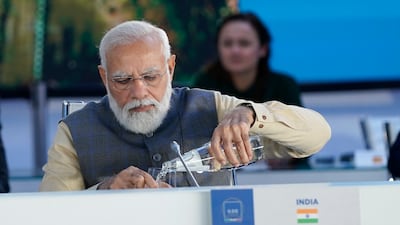New Delhi's attempts at maintaining a neutral stance on the Ukraine crisis will be tested to the limit as foreign ministers from around the world gather for the two-day G20 summit in the capital.
The summit, which begins on March 1, comes a week after the first anniversary of Russia's invasion of Ukraine, which has left at least 300,000 dead and wounded on both sides.
The US and its allies have so far committed more than $130 billion in military and civilian aid to Ukraine and have asked non-western allies to limit, or in some cases, cut ties with Moscow.
India has tried to stay neutral over the year-long war between its historic friend Moscow and new partners in the West — led by the US and the EU who are actively backing Kiev against the Kremlin.
The Western nations faced a setback at the global forum after failing to reach a consensus to issue a joint statement denouncing Russia for its war against Ukraine last week, at the first high-profile G20 finance ministers meeting under India’s G20 presidency.
Russia and China resisted the US move to issue a statement, with many media reports suggesting that New Delhi played along to avoid controversy and instead issued a chair’s summary that said, “most members strongly condemned the war in Ukraine and stressed that it is causing immense human suffering and exacerbating existing fragilities in the global economy”.
The Western allies have imposed tough economic sanctions on Moscow and tried to isolate it globally over the war, but New Delhi has so far refused to join the US-led bloc against Kremlin.
But as US Secretary of State Anthony Blinken, Russian Foreign Minister Sergey Lavrov and Chinese Foreign Minister Qin Gang come face to face in New Delhi on Thursday, India will be in a tight spot.
"Given what happened at the finance ministers' meeting, it's going to be difficult for India to find language on Ukraine acceptable to everybody,” Jitendra Nath Misra, a former Indian ambassador and a professor at O P Jindal Global University told The National.
“It is possible, but India’s diplomacy is going to be seriously tested”, he said.
Focus on multilateralism
India, which assumed the annual presidency of the G20 last December, will be hosting some 40 global leaders this week, including at the G20 foreign minister's meeting — a major event ahead of the final Summit in September this year — and other major diplomatic events scheduled this week.
G20 is an intergovernmental forum of the world’s major economies — 19 countries and the EU, along with some specially invited nations like the UAE and Bangladesh.
The bloc addresses major issues related to the world economy, financial stability, climate change mitigation and development.
The leaders will address major global challenges like rising food and energy prices, growing debt, and poor economic recovery after the pandemic.
Counterterrorism and humanitarian assistance and disaster relief will also remain under focus at the summit, as well as an assessment of new security and economic challenges.
Indian Prime Minister Narendra Modi is expected to address the foreign ministers and other member countries as he seeks to carve out a strong position for India in global geopolitics.
New Delhi has been trying to emerge as a “voice of the Global South” and work to “depoliticise” the global supply of food, fertilisers, and medical products in the aftermath of the Covid pandemic and Ukraine war.
“The G20 has provided India with an opportunity to be accepted as a leader in the world and to take on the various important initiatives that are actually related to the kinds of challenges that we are facing today,” Anil Trigunayat, a former diplomat, told The National.
“It is becoming an engine for the objectives of developing countries to alleviate the situation and the kind of apartheid of various kinds that exists in this current global order, further damaged by the Russia-Ukraine war, especially the weaponisation of financial instruments, the weaponisation of energy, the weaponisation of food and fertilisers,” he said.
Peacemaker
In this context of global shortages, the talks are most likely to be dominated by the continuing crisis as Russia and Ukraine were major producers of wheat and fertiliser before the war began.
New Delhi has even offered to help de-escalate the situation, but at the same time has increased trading ties with Russia, including oil imports despite Western capitals rapidly cutting down energy imports from Moscow.
Europe now imports less than eight per cent of the volume of Russian oil and gas it purchased before the invasion.

During the Shanghai Co-operation Organisation summit in September last year, Mr Modi had told Russia's President Vladimir Putin that it was “not the time for war”.
"India will try to steer the agenda away from Ukraine towards the G20’s original mandate, which is development and economics, but may not succeed. Both sides are taking maximalist positions, whether it is the West led by the US, or Russia, supported by China,” Mr Misra said.
The summit will be overshadowed by recent tensions between the US and China after Washington accused Beijing of sending a spy balloon that was shot down by US military, which led to Mr Blinken cancelling his visit to the rival nation.
China has claimed that the balloon had drifted from its course and its top diplomat Wang Yi has said that the US handling of the balloon incident had been “unimaginable” and “hysterical”.
The escalation in tensions comes when New Delhi will be hosting a Quadrilateral Security Dialogue (QUAD) meeting on the sidelines of G20 foreign ministers meeting.
QUAD is an informal strategic grouping of the US, Japan, Australia, and India mainly to counter China’s influence in the Asia-Pacific region.
China has expressed its reservations over the alliance and has called it an Asian version of Nato.


